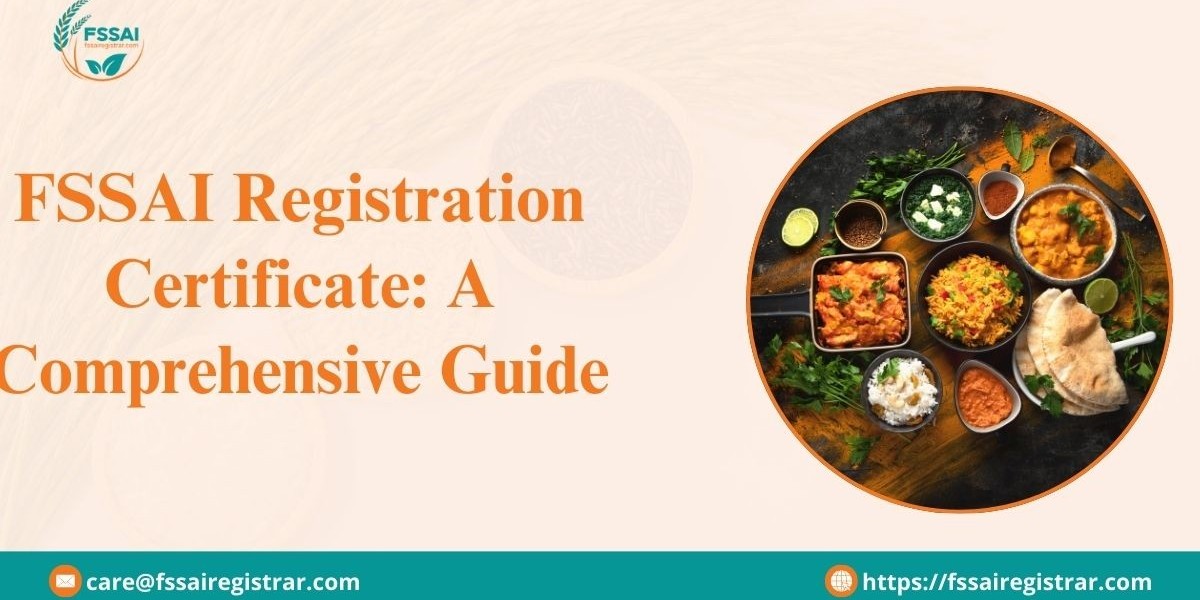The Food Safety and Standards Authority of India (FSSAI) is the regulatory body responsible for overseeing food safety and standards in India. For any food business operator (FBO) in India, obtaining an FSSAI registration certificate is a mandatory requirement. This certificate ensures that food products are safe, hygienic, and meet the standards set by the government. If you're looking to start a food-related business or expand your existing one, understanding the importance of an FSSAI registration certificate is crucial. This article dives deep into the details of the FSSAI registration certificate, including its significance, eligibility, application process, and benefits.
What is FSSAI Registration?
FSSAI stands for the Food Safety and Standards Authority of India. It is an autonomous body under the Ministry of Health and Family Welfare, Government of India. The FSSAI registration certificate is a legal requirement for all food businesses in India, whether they are manufacturers, processors, retailers, or restaurants. It ensures that the food produced and sold meets quality and safety standards and is free from any harmful substances that could pose health risks to consumers.
Who Requires an FSSAI Registration Certificate?
An FSSAI registration certificate is required for all food businesses in India. This includes:
- Manufacturers: Any business that processes, packs, or manufactures food products.
- Retailers: Businesses involved in the sale of food products.
- Restaurants and Cafes: Any food-serving establishments, including restaurants, cafes, food courts, and catering services.
- Wholesalers: Businesses involved in the bulk sale of food products.
- Importers: Those who import food products into India.
There are different types of FSSAI registrations based on the scale of business, which we will explore later in this article.
Types of FSSAI Registration
FSSAI categorizes businesses into three types based on their size and turnover. The type of FSSAI registration required depends on the scale of your food business.
a. Basic FSSAI Registration
The Basic FSSAI Registration is meant for small food businesses with an annual turnover of up to ₹12 lakhs. This category is ideal for small-scale food operators like small eateries, home-based food manufacturers, and petty food retailers.
b. State FSSAI License
For businesses with a turnover between ₹12 lakhs and ₹20 crores, the State FSSAI License is required. This license is meant for medium-sized food businesses, including manufacturers, processors, and restaurants that operate within a particular state.
c. Central FSSAI License
The Central FSSAI License is meant for large food businesses that have an annual turnover exceeding ₹20 crores. This category includes businesses involved in the import or export of food products, large-scale manufacturers, and national food chains.
How to Apply for an FSSAI Registration Certificate?
The process of obtaining an FSSAI registration certificate is relatively simple and can be completed online. Here's a step-by-step guide on how to apply for FSSAI registration:
Visit Website – Open the official FSSAI registration portal.
Fill Application Form – Enter your name, business details, and food category, and upload your PAN card.
Review & Submit – Check all details and submit the form.
Pay Fee – Complete the payment online as per your license type.
Verify OTP – Enter the OTP sent to your registered mobile or email.
Inspection (If Required) – Officials may inspect your premises for approval.
Get an FSSAI License – Once approved, download your FSSAI license from the website
Documents Required for FSSAI Registration
To apply for an FSSAI registration certificate, you will need to submit the following documents:
- Business Address Proof: This can be a rent agreement, electricity bill, or any official document showing the address of the food business.
- Identity Proof of the Applicant: A government-issued ID such as Aadhar Card, PAN Card, or Passport.
- Photographs: Passport-sized photographs of the applicant and authorized signatories.
- Food Safety Management Plan: For businesses that require a license, this includes details about hygiene practices and food safety measures.
- No Objection Certificate: For businesses that require a State or Central license, you may need to submit a No Objection Certificate from the local authorities.
Benefits of FSSAI Registration
There are several benefits to obtaining an FSSAI registration certificate for your food business:
a. Legal Compliance
FSSAI registration ensures that your business complies with the food safety laws of India, which is crucial to avoid legal issues and penalties.
b. Consumer Trust
Having an FSSAI registration certificate builds trust with your customers. Consumers are more likely to purchase food products from a business that has the FSSAI logo, knowing that the food is safe and of high quality.
c. Access to Larger Markets
With an FSSAI registration certificate, businesses can expand their operations and sell products in national and international markets, particularly for those with a State or Central License.
d. Brand Reputation
Being registered with FSSAI helps in enhancing the brand image of your business, as it demonstrates your commitment to quality and safety standards.
e. Avoids Legal Issues
Operating without an FSSAI registration can lead to legal issues, fines, and penalties. Having the certificate ensures that your business adheres to food safety standards and avoids legal complications.
Note:- Now you can easily apply for Tatkal FSSAI Registration
Conclusion
An FSSAI registration certificate is not just a legal requirement; it is an essential aspect of operating a successful food business. It ensures the safety, hygiene, and quality of food products, which is crucial for building consumer trust and expanding your business. Whether you are a small-scale retailer or a large food manufacturer, obtaining FSSAI registration is an important step in growing your food business and ensuring compliance with Indian food safety regulations.



